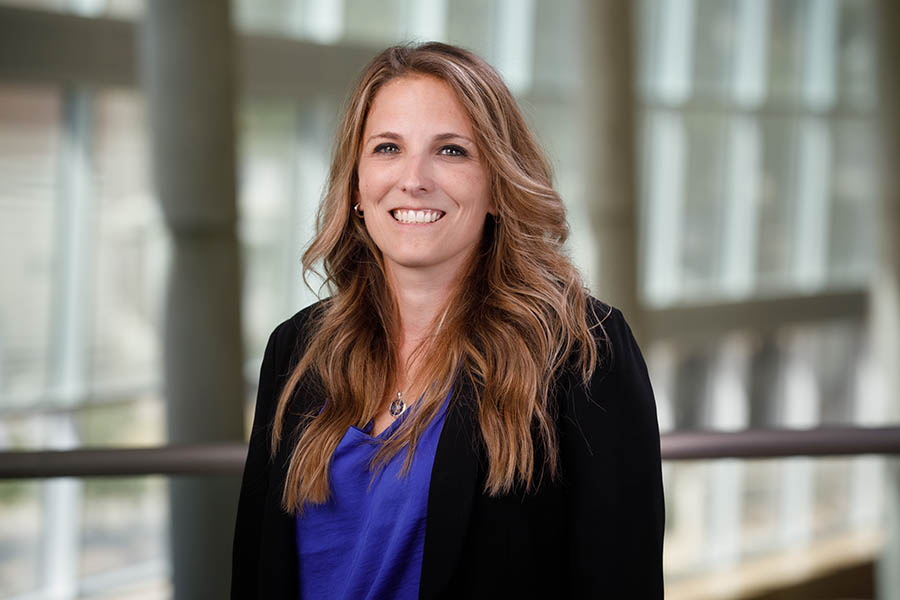Early Intervention

Early Intervention for children who are diagnosed with autism spectrum disorder provides a continuum of care that includes evaluation, school consultation, clinic-based intervention and home-based program development.
Emphasis is placed on improving communication and social interactions and reducing barriers to learning. This program is appropriate for children ages 2–10 who are diagnosed with autism spectrum disorder or other developmental disability. Children move through the program based on their individual needs.
The Early Intervention Program is located at the Munroe-Meyer Institute, serving children ages 2-10 diagnosed with autism spectrum disorder.
Program Focus
In addition to replacing problem behavior, this program focuses on improving:
- Daily living skills (e.g., potty training).
- Language skills.
- Pre-academic and academic skills.
- Social skills.
Clinic Details
- Programming is individualized based on each child’s strengths and areas of need.
- Various assessment tools are used to assess each child’s skill level upon entry to the clinic and every six months thereafter. These assessments identify areas in need of intervention, which may include skills in the areas of receptive and expressive language, adaptive behavior (e.g., challenging behavior and self-help skills), pre-academics, social interactions or play.
- Services are provided by undergraduate- and graduate-level behavioral therapists in various disciplines (e.g., speech-language pathology, psychology, special education).
- Therapists are Registered Behavior Technicians.
- Training and ongoing supervision is provided by Board Certified Behavior Analysts and/or Licensed Mental Health Practitioners with expertise in Applied Behavior Analysis.
- The amount of weekly, clinic-based hours depends on the needs of the child and scheduling availability.
- The amount of treatment ranges from 1.5 to 4 hours, five days a week.
Caregivers and members of the behavioral team attend regularly scheduled formal goal meetings to assess the child’s progress and develop new measurable goals. Primary therapists maintain ongoing contact with caregivers between goal periods to discuss the child’s progress and address questions.
- Clinic services also includes a caregiver-training program that teaches the skills required to increase language, decrease challenging behaviors and promote generalization of skills in home and community settings.
- Instructional information is delivered in a one-on-one format during which behavioral techniques are described and modeled by Board Certified Behavior Analysts on our staff. Each caregiver is given an opportunity to practice skills through role-play and/or with their child and feedback is delivered.
- Outside of structured caregiver training sessions, caregivers are encouraged to attend parts of their child’s sessions regularly to participate in the therapy process. Supervising Board Certified Behavior Analysts also work with caregivers to problem-solve concerns that arise outside of the clinic setting.
- Each child works one-on-one with a behavioral therapist.
- Therapy activities include a combination of structured learning opportunities (e.g., discrete-trial teaching) and naturalistic instruction (e.g., within small-group activities and play settings).
- Many insurance providers offer coverage for our services. We encourage you to check with your insurance company to confirm your benefits before enrolling in the clinic.
Program Steps
Clients vary in functioning levels. Some children are in the initial stages of learning while others display advanced language skills but exhibit deficits in social interactions with peers. The first step is to evaluate your child's strengths and identify areas of greatest need.
Initial Evaluation
Children are seen by a team of specialists with training and expertise in behavioral interventions. Some children may benefit from highly intensive early intervention, while other children may only require limited visits to our clinic or consultation between our staff and school personnel. Our goal is to identify a number of developmental and behavioral procedures that will result in the most rapid acquisition of targeted skills.
Program Selection
Children with autism spectrum disorder may not acquire skills through daily interactions in their home or school environment like many of their typically developing peers. Based on the needs of each child, our staff will develop a program of language, social, pre-academic, academic and daily living skills. To effectively teach children with autism spectrum disorder, tasks are broken down into small, measurable units, and each skill is practiced repeatedly until the child masters it.
Treatment
During therapy sessions, evidence-based strategies are used to teach a variety of skills. Trained therapists conduct behavioral procedures based on behavior-analytic and developmental principles. Programs take place across settings ranging from individualized work at a desk to naturalistic play interactions with adults and/or peers. Progress is continuously monitored as data are graphed, reviewed and analyzed by therapists and supervising psychologists. Data are used to guide program development and refine interventions.
Generalization
Once skills are mastered, they are practiced periodically to make sure children maintain them. Each skill is practiced in different settings to ensure the skill occurs in a variety of environments and with a variety of people.
Caregiver Training
Once an effective treatment is developed, parents and caregivers are trained on how to use it. Long-term success of the treatment depends on how accurately the program is carried out by parents, teachers, in-home aides, and other caregivers. To facilitate accurate use of the treatment, caregiver training includes written and spoken instruction, modeling, role-play and feedback.

Autism Spectrum Disorder
Autism Spectrum Disorder is a neurological and developmental disorder that affects how the brain functions – how people interact with others, communicate, learn and behave.
Make an Appointment
Individuals can self-refer or be referred by a physician or other health care professional, social service agency, family member or caregiver.
Appointments for this program are scheduled directly through the iCASD department, not through MMI's Patient Information Office.
Toll Free: 1-800-656-3937 ext. 402-559-3716

Nicole M. Rodriguez, PhD, BCBA-D, LBA
Professor, MMI integrated Center for Autism Spectrum Disorders
Director, MMI Doctoral Applied Behavior Analysis Program
Director of Early Intervention, Munroe-Meyer Institute iCASD
Board Certified Behavior Analyst